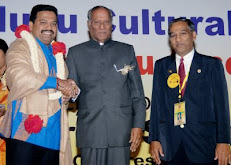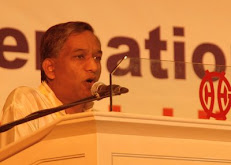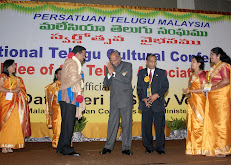Why our state was not named Telangana or Telugunadu?
Separate state proponents often gripe about the name of our state as some sort of a conspiracy. So, let us peek into our history to understand how our state got its name- Andhra Pradesh.
Our tribe was originally called the Andhras and the term Telugu came much later. Some of the early mentions of Andhras were found in the Aitareya Brahmana of 600 BC. Whereas, the early references to Telugus were found many centuries later in the Puri inscription of the Indra Verma of Gangas.
Andhra and Telangana interchangeably represent the same region and sect of people i.e., those living in the state of Andhra Pradesh.
In the Kakatiya Empire, Telangana represented the current geography of Andhra Pradesh and bordering areas.
Nizam for some time ruled the entire geography of the current Andhra Pradesh, as well as parts of today’s Karnataka and Maharashtra. Under Nizam, Telugu region was called Telangana.
In 1800’s, French and British had their eyes set on Telangana’s coastline for defense and maritime reasons. When Nizam Asaf Jah died, his sons got into a bitter fight for the Hyderabad throne. By taking sides with the feuding princes, French got hold of Coastal Telangana i.e., today’s Kosta or Coastal Andhra. Later on, the British wrestled Coastal Telangana out of French hands.
Ironically, as recently as 60 years ago, Telugus living in Nizam Telangana used to passionately identify themselves as the Andhras. When Telugus living under Nizam established libraries in their region, they called them Andhra Bhaasha Nilayamulu.
One of the oldest non-government libraries in Nizam Telangana was established in 1901, in Ramkoti, Hyderabad and was named Sri Krishnadevaraya Andhra Bhasha Nilayam. This library later became a hub for cultural and political activity for Telugus suffering under Nizam rule. Similarly, when Telugus living in the Telangana heartland Warangal wanted to establish a library in the early 1900s, they named it Raja Raja Narendra Andhra Bhasha Nilayam. Again, in 1923, another library established in Hyderabad was called Vemana Andhra Bhasha Nilayam.
Telugus living under Nizam faced atrocious discrimination. Urdu and Maratha were the dominant languages while Telugu language was often ridiculed as “Telangi Bedhanghi”.
In 1921, in the Hyderabad’s Vivekavardhani Theater, a public meeting was held. All the speakers spoke in Urdu or Maratha. When it was the turn of high court lawyer Allampalli Venkatarama Rao, he got up and spoke in Telugu. Participants in the meeting protested to him speaking in his mother tongue and shouted down his speech.
This incident was the starting point for Telugus rising up against Nizam. Telugu men left this meeting in frustration and formed an organization called Andhra Jana Sangham- yes, not Telugu Jana Sangham not Telangana Jana Sangham, but Andhra Jana Sangham.
Andhra Jana Sangham later changed its name to Andhra Mahasabha. To differentiate itself from the Kosta organization carrying the same name, it was called the Nizam Andhra Mahasabha or NAMS.
Nizam was troubled with the use of Andhra in all the organizations and institutions that Telugus in Nizam Telangana were forming. He suspected Hyderabad state Telugus of having an ulterior motive to merge with their Kosta and Seema brethren in the neighboring Madras Presidency.
Once, Nizam’s emissary and close confidant, Nawab Aliyar Zang, approached Andhra Pitamaha Madapati Hanumanth Rao and said: “…it came to our government’s notice that the purpose of your Andhra movement is to merge the Andhra districts of Madras and the Andhra districts of Nizam’s dominion.”
Despite Nizam’s overt concerns about the use of the term Andhra, Telugus refused to rename their organization to Telangana Mahasabha or Telugu Mahasabha.
I go into a greater detail about Nizam Andhra Mahasabha’s heroic fight against Nizam in my book. But, here’s the gist- Nizam Andhra Mahasabha went on to become a formidable organization that became Nizam’s worst nightmare. It shook up the foundation of the Hyderabad state. In the violent struggle against the Razakars, thousands of Nizam Andhra Mahasabha leaders gave up their lives.
So, where did this current antagonism for the term “Andhra” came from?
In 1953, Nehru described Telugus desire to merge into one state as “expansionist imperialism”. Taking advantage of Nehru’s disinclination for a unified state, leaders like Dr. Marri Chenna Reddy, who till then were in favor of an integrated state, demanded a separate Telangana state. However, there was an overwhelming desire across all the Telugu regions for Vishalandhra. As a result, Nehru held extensive negotiations with the leaders of all the regions and conceded to the formation of a united Telugu state.
Telugu’s dream for Vishalandhra became a reality with the signing of the Gentlemen’s Agreement. One of the sticking points during the negotiations was the name of the state. Leaders from Kosta and Rayalaseema wanted to name the state Andhra Pradesh, while some of the leaders from Nizam Telangana wanted to name it Andhra-Telangana. In the end agreement was reached to name the state Andhra Pradesh.
So, that is the origin for today’s claims about Kosta conspiracy to name the state Andhra Pradesh. However, the undeniable fact is that Telugu people scattered across Tamil, Kannada, Maratha, and Oriya regions have always identified themselves as Andhras.
There is no conspiracy behind calling ourselves Andhras. We all are Andhras, we all are Telingis, and we all are Telugus. The new definition of Andhra to represent Kosta and the new definition of Telangana to represent nine districts of Nizam Telangana is a fabrication of politicians intending to create a wedge between the Telugu tribe.
The same breed of separatist politicians is continuing to harvest hatred among Telugus after more than five decades since our state came into existence. Sadly, my Telugu brethren are continuing to fall for the separatists’ antics.
Save Andhra Pradesh!
This article by Nalamotu Chakravarthy
http://www.myteluguroots.com
http://www.facebook.com/people/@/226703252445
http://twitter.com/nalamotu
http://www.amazon.com/My-Telugu-Roots-Telangana-Bhasmasura/dp/0984238603/



































.jpg)
.jpg)
.jpg)
.jpg)
.jpg)

